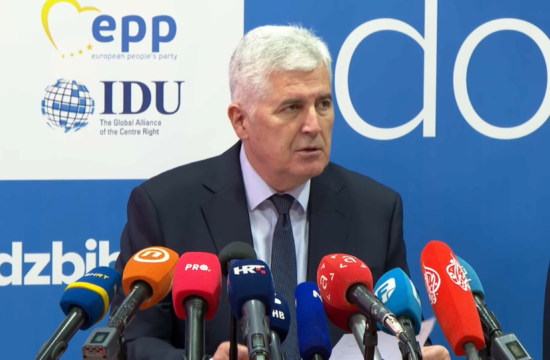
Croatian police are turning migrants back to Bosnia and Herzegovina, in some cases violently, denying them the opportunity to apply for asylum in that country, Human Rights Watch (HRW) said in a report on Tuesday.
The New York-based human rights organisation said they interviewed 20 people, including 11 heads of families and one unaccompanied minor, who told HRW that Croatian police had deported them back to Bosnia and Herzegovina without due process after detaining them deep inside Croatian territory.
Sixteen of them, including women and children, said police beat them with batons, kicked and punched them, stole their money, and either stole or destroyed their mobile phones.
“Croatia has an obligation to protect asylum seekers and migrants,” Lydia Gall, Balkans and Eastern EU researcher at Human Rights Watch, said in Budapest. “Instead, the Croatian police viciously beat asylum seekers and pushed them back over the border,” she added.
All 20 interviewees gave detailed accounts of being detained by people who either identified themselves as Croatian police or wore uniforms matching those worn by Croatian police. Seventeen gave consistent descriptions of the police vans used to transport them to the border. One mother and daughter were transported in what they described as a police car. Two people said that police had fired shots in the air, and five said that they saw police officers wearing masks.
Mounting evidence of police abuse
These findings confirm the mounting evidence of abuse of migrants at Croatia's external EU border with Bosnia and Herzegovina, Human Rights Watch said.
In December 2016, Human Rights Watch documented similar abuses by Croatian police at Croatia's border with Serbia. The Office of the United Nations High Commissioner for Refugees (UNHCR) reported in August 2018 that it had received reports that Croatia had summarily pushed back 2,500 migrants and asylum seekers into Serbia and Bosnia and Herzegovina since the beginning of the year, at times accompanied by violence and theft.
In response to a call by the Council of Europe's human rights commissioner to investigate the allegations, Prime Minister Andrej Plenkovic in September denied any wrongdoing and questioned the sources of the information, HRW said.
Police in the Croatian town of Donji Lapac, on the border with Bosnia and Herzegovina, refused to provide Croatia's ombudswoman, Lora Vidovic, access to police records on the treatment of migrants, and told her that police are acting in accordance with law, HRW added.
In a December 4 letter, Interior Minister Davor Bozinovic responded to a detailed description of the Human Rights Watch findings. He said that the evidence of summary returns and violence was insufficient to bring criminal prosecutions, that the allegations could not be confirmed, and that migrants accuse Croatian police in the hope that it would help them enter Croatia. He said that his ministry does not support any type of violence by police officers.
Croatia has a bilateral readmission agreement with Bosnia and Herzegovina that allows Croatia to return third-country nationals without legal permission to stay in the country. According to the Security Ministry of Bosnia and Herzegovina, between January and late November, Croatia returned 493 people to Bosnia and Herzegovina, 265 of whom were Turkish nationals. None of the people Human Rights Watch interviewed underwent any formal return procedure before being forced back over the border.
Croatian police abuse is contrary to EU law and conventions
The summary return of asylum seekers without consideration of their protection needs is contrary to European Union asylum law, the EU Charter of Fundamental Rights, and the 1951 Refugee Convention, HRW noted.
The organisation called on Croatian authorities to conduct thorough and transparent investigations of abuse and hold those responsible to account. Authorities should ensure full cooperation with the Ombudswoman's inquiry, as required by national law and best practice for independent human rights institutions, it added.
The European Commission should call on Croatia, an EU member state, to halt and investigate summary returns of asylum seekers to Bosnia and Herzegovina and allegations of violence against asylum seekers. The Commission should also open legal proceedings against Croatia for violating EU laws, Human Rights Watch said.
As a result of the 2016 border closures on the Western Balkan route, thousands of asylum seekers were stranded, and found new routes toward the EU.
In 2018, migrant and asylum seeker arrivals increased in Bosnia and Herzegovina, from fewer than 1,000 in 2017 to approximately 22,400, according to the European Commission. The Commission estimates that 6,000 migrants and asylum seekers are currently in the country. Bosnia and Herzegovina has granted international protection to only 17 people since 2008. In 2017, 381 people applied for asylum there.
Bosnia and Herzegovina has only one official reception center for asylum seekers near Sarajevo, with capacity to accommodate just 156 people.
Asylum seekers and migrants in the border towns of Bihac and Velika Kladusa in northwestern Bosnia, where Human Rights Watch conducted the interviews, are housed in temporary facilities managed by the International Organization for Migration (IOM). These are a dilapidated building, a refurbished warehouse, and former hotels.
The IOM and UNHCR have been improving the facilities. The EU has allocated over €9 million to support humanitarian assistance for asylum seekers and migrants in Bosnia and Herzegovina.
“Just because the EU is sending humanitarian aid to refugees in Bosnia and Herzegovina, that does not justify turning a blind eye to violence at the Croatian border,” Gall said. “Brussels should press Zagreb to comply with EU law, investigate alleged abuse, and provide fair and efficient access to asylum.”
In their report, HRW gave detailed accounts of interviews done with thirteen men, six women, and a 15-year-old boy about their treatment at the hands of Croatian police.




